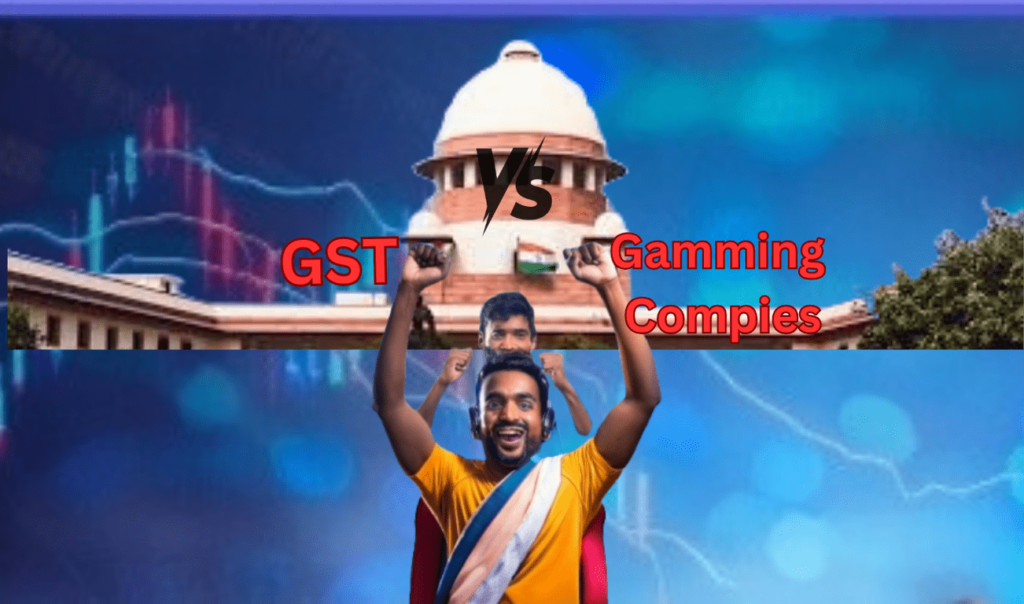Supreme Court Stay on GST Action Against E-Gaming Companies, Causes Positive Market Reaction on E-GC’s like Gameskraft and Games24x7 etc

Quick Overview
On Friday, the Supreme Court of India issued a stay on Goods and Services Tax (GST) proceedings against 49 online gaming companies, halting retrospective demand notices that alleged GST evasion amounting to ₹1.1 lakh crore. This decision has been seen as a significant relief for the gaming sector, leading to an increase in share prices for some companies. The court has scheduled further hearings for March 18, 2024.
Key Points
- Supreme Court’s Interim Order: The stay on GST proceedings is a temporary relief for online gaming companies facing hefty tax demands.
- Potential Tax Liability: The total liability for these companies could reach ₹2.3 lakh crore, considering the GST Act allows penalties of up to 100% of the tax demand.
- New GST Tax Rate: In October 2023, the GST Council imposed a 28% tax on the face value of online gaming bets, which has been contested by the industry.
- Industry’s Taxation Argument: The gaming sector advocates for taxation based on gross gaming revenue (GGR) rather than the face value of bets, which they argue is more equitable.
- Market Reaction: The Supreme Court’s ruling has positively impacted stock prices for several gaming companies, despite a general market downturn.
Detailed Breakdown
Supreme Court’s Decision
The Supreme Court’s interim order has temporarily halted the GST proceedings against 49 online gaming companies. This comes in response to show-cause notices alleging substantial GST evasion. The justices, J B Pardiwala and R Mahadevan, have set a further hearing date for March 18, 2024, allowing the companies time to prepare their cases.
Potential Financial Impact
The stakes are high for these companies, as the GST Act permits penalties that could double their tax liabilities. With the alleged evasion amounting to ₹1.1 lakh crore, the total possible liability could balloon to ₹2.3 lakh crore if penalties are enforced. This potential financial burden has raised concerns among industry stakeholders about the sustainability of their businesses under such punitive measures.
Changes in GST Regulations
In October 2023, the GST Council established a new tax rate of 28% on the face value of online gaming bets. This change was interpreted by tax authorities as a clarification, leading to increased tax demands retroactively for prior periods. Many online gaming companies have contested these retrospective notices, arguing that they are unfair and detrimental to the industry.
Industry’s Position on Taxation
The online gaming sector is advocating for a shift in how taxes are calculated. Currently, companies are taxed on the face value of bets, which can significantly inflate their tax obligations. The industry argues that a more appropriate method would be to tax based on gross gaming revenue (GGR), which reflects actual earnings after payouts to players. This method would provide a more accurate representation of the industry’s financial health and reduce the tax burden on operators.
Market Reaction and Share Prices
Following the Supreme Court’s stay, stock prices for several online gaming companies surged. For instance, Delta Corp, a casino operator, saw a 4.9% increase in its share price, while Nazara Technologies experienced an 8.5% rise before settling at 3.3% lower by the end of the trading day. This market reaction indicates investor optimism regarding the future of the gaming industry in light of the court’s ruling, despite a general decline in the stock market.
Important Details & Evidence
- Retrospective Tax Notices: Companies like Gameskraft and Games24x7, among others, have filed petitions against the retrospective GST notices, arguing that these demands are excessive and unjust.
- Previous Legal Precedents: The Supreme Court had previously stayed a Karnataka High Court judgment that quashed a GST notice against Gameskraft for alleged evasion of ₹21,000 crore, indicating a pattern of legal challenges within the industry.
- Industry Advocacy: Saumya Rathore, co-founder of Winzo, expressed optimism about the need for clarity in GST regulations, suggesting that a fair resolution could enhance innovation, job creation, and investor confidence in the Indian gaming ecosystem.
Final Takeaways
The Supreme Court’s stay on GST proceedings against online gaming companies marks a pivotal moment for the industry, providing temporary relief from substantial financial liabilities. The ongoing debate over the appropriate method of taxation—whether on face value of bets or gross gaming revenue—continues to be a critical issue for stakeholders. As the court prepares for further hearings, the gaming industry remains hopeful for a resolution that fosters growth and positions India as a leader in the global consumer tech landscape. The positive market reaction underscores the potential for recovery and expansion within the sector, contingent upon favorable regulatory outcomes.